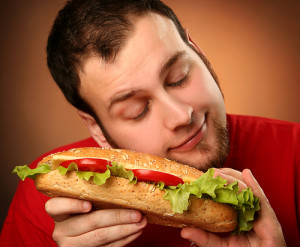 Binging on food is triggered by the same impulses that trigger a person to binge on drugs and alcohol. The reasons for overusing food are very similar to the reasons for overusing other substances. We have other harsh descriptions for it, such as gluttony, overeating and piggishness, but when it comes right down to it, being addicted to food is actually a type of substance abuse. Not many people think of a food addiction as a type of substance abuse, but that is exactly what it is.
Binging on food is triggered by the same impulses that trigger a person to binge on drugs and alcohol. The reasons for overusing food are very similar to the reasons for overusing other substances. We have other harsh descriptions for it, such as gluttony, overeating and piggishness, but when it comes right down to it, being addicted to food is actually a type of substance abuse. Not many people think of a food addiction as a type of substance abuse, but that is exactly what it is.
Many elements of food are addictive, such as salt and sugar, and when people who cannot control their cravings very well get these urges, over eating ensues. When they are done, they receive temporary feelings of satisfaction from over eating and tell themselves that it will not become a pattern. Like all substance abuse patterns, over eating begins with cravings for food.
Every time a person overeats, a pattern is established more and more firmly within their neural network. That pattern is the release of brain chemicals that tell the person they are starving and they cannot handle themselves if they do not binge again soon. This cycle is almost impossible for the person to resist and always results in continued overeating until the individual has a personal breakthrough. The cycle of overeating dictates that the following cravings will be even stronger.
Obesity is a bigger problem in North America than it is in any other region of the world. However, in order to view it correctly, it must be understood as substance abuse and harmful to personal health. If you or somone you are close to is struggling with a food addiction, seek the help of a mental health professional right away. Food addiction is much more socially acceptable than other forms of addiction, such as alcoholism or drug addiction, so there are more cases of it than other types of substance abuse.